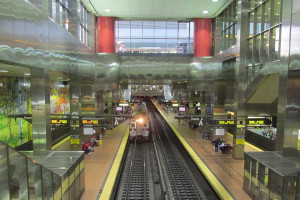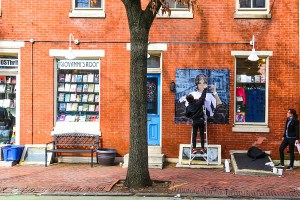Is St. Joe’s Prep Still a Power Factory?
John J. Dougherty looks ready to fight. His mouth is set in a grim line, his hard eyes are wide open, and his eyebrows are arched like the back of a cat prepared to pounce. Mayor Nutter wears a well-practiced smile. He comes across as friendly and self-possessed, but seems to be holding part of himself back. Councilman Jim Kenney resembles a shaggy, good-natured dog; his colleague William K. Greenlee looks a bit like a turtle, and Councilman Brian O’Neill sports a cocky grin. Then there is Vincent Joseph Fumo, with his handsome features—indeed, they’re almost delicate—arranged just so, hinting at the hauteur to come.
These early glimpses of Philadelphia’s political elite all have the same source: the yearbooks published by St. Joseph’s Preparatory School, the North Philadelphia institution that is the city’s preeminent power factory.
This Jesuit-run school for boys has educated two of Philadelphia’s last five mayors, three current members of City Council, political operators like Doc and A. Bruce Crawley, and a large chunk of the more anonymous elites who make this city run: attorneys and high-powered bureaucrats, CEOs, judges and journalists.
And it’s no accident. “We want to influence power,” Father Bruce Maivelett, the Prep’s director of mission and ministry, tells me matter-of-factly. “And that is one of the primary reasons why we’re involved in the ministry of education.”
For most of its 161-year history, the Prep has influenced power by taking Philly’s smartest and most ambitious middle-class Catholic boys and turning them into men who are inclined to wield power, and unusually adept at doing so. It’s not an exaggeration to say that the Prep, for better or worse, has helped to define Philadelphia’s political culture. Its graduates—both those in the public eye and those who prefer the back rooms—exercise that much clout.
[Click here to see high school yearbook photos of some of Philly’s most powerful men.]
But the Prep is changing. Indeed, it’s been changing for some time. Tuition there has increased sharply, and so has the percentage of wealthy suburban students. There are far fewer bright, streetwise city kids in the Prep’s hallways today than when Nutter and Dougherty were enrolled. The Jesuits themselves are in shorter supply at the Prep as well. Even the long-bleak blocks surrounding the school at 18th and Girard Avenue are changing, as gentrification pushes north.
All of which means the Prep is now manufacturing different sorts of leaders than in years past. Some worry that the new generations will be less interested in pulling the levers of power in Philadelphia. And that’s possible. But there’s also reason to hope that those students who take up the Jesuit call to influence power will be better at it than the Prep-trained leadership class we have today.
On the second-to-last day of January in 1966, a blizzard swept into Philadelphia. The temperature dropped to 10 degrees, and 8.4 inches of snow fell on the city. These little details have been carefully recorded because at 5:20 a.m. that morning, a fire broke out in the basement of St. Joseph’s Preparatory School. Within four hours, two-thirds of the school lay devastated, the remains still smoking even as they were sheathed in ice.
For the school, the most obvious—and easiest—answer was to leave. To take the $2 million in insurance money and get the hell out of North Philadelphia, a neighborhood in rapid decline. But the Jesuits flatly refused. Their work was in the city.
That call—the decision to double down on North Philadelphia just as everyone else with means was bailing out—cemented the Prep’s status as the training ground of choice for the most talented kids in the city’s working and middle classes. Kids like Michael Nutter (class of 1975), who probably would have gone to a military school had a nun not convinced him to apply to the Prep. He describes it as a place where “those with virtually no means meet up with those of lots of means. But you’re all the same at the school. You wear a jacket and a tie, you speak well, and you do your work.”
The Irish-Catholic Kenney (class of 1976) is an even more prototypical Prep alum. He commuted to the school on the subway each day with a pack of other South Philly rowhome boys trying to navigate their way safely to 18th and Girard wearing sport coats and ties. He tells a story about an after-school fight featuring two popular students—one white, one black—at a time of rising racial tension within the school: “It felt like an hour-long spectacle. One would knock the other down and wait for him to get up. It was brutal and bloody. I don’t know if anyone won.” When it was over, Kenney glanced up, and there on the balcony, watching in silence, were the Jesuits. “No one interceded. They knew it had to happen. They let us figure it out.”
The Prep of old, in other words, didn’t coddle its students. Those who could hack it say they formed deeply personal bonds by the time they graduated. Nutter leaned on a history teacher and his football coach while going through some “very, very tough times at home.” And his two best friends to this day are Prep grads. (One is the Mayor’s personal physician; the other is Robert Bynum, proprietor of Warmdaddy’s, Green Soul, Relish and Heirloom.)
A critical component of the Prep power-making formula is the multifaceted Jesuit tradition. Much of it boils down to the hokey and patronizing but somehow still powerful Jesuit credo to be “men for and with others.” Layered atop that is the well-deserved Jesuit reputation for bucking authority, both the papal and civil varieties. It’s a quality that Prep graduates prize, and one that more than a few have plainly absorbed. “It all starts with the Jesuits,” says Dougherty, recalling how they taught him to question everything, to take no answer at face value.
Start with ambitious working-class kids. Give them outstanding educations. Hone their sense of competitiveness to a fine edge. Cultivate their connections to the city. And stress the value of serving others. That has been the core of the Prep’s formula to, as Maivelett puts it, “produce men who will be influential in the power centers.”
It’s not that the Prep hooks up its graduates with positions in political organizations, or that it explicitly steers its students in that direction. After leaving the Prep, an 18-year-old Nutter thought he’d be a doctor, not a mayor. But today, he credits the Prep for making him into a man capable of doing his job. Not 48 hours after he was first sworn in as mayor in 2008, Nutter went back to the Prep to speak to the students. It was a raucous, emotional scene. “I think it should be clear to you what your mission is,” Nutter told the students. “You’re being trained right here to be leaders of your community.”


